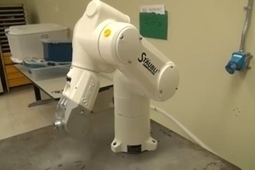General Electric is trying to streamline surgical tool care in hospitals by taking humans out of the equation and letting a robot do the dirty work.
An infection occurs in 1 to 3 surgery patients out of a hundred. While efforts are constant to minimize surgical site infections – improved operating room ventilation, improved sterilization methods, the use of antimicrobials – they are still the most common type of healthcare-associated infections, accounting for approximately 31 percent of infections contracted by hospitalized patients.



 Your new post is loading...
Your new post is loading...









